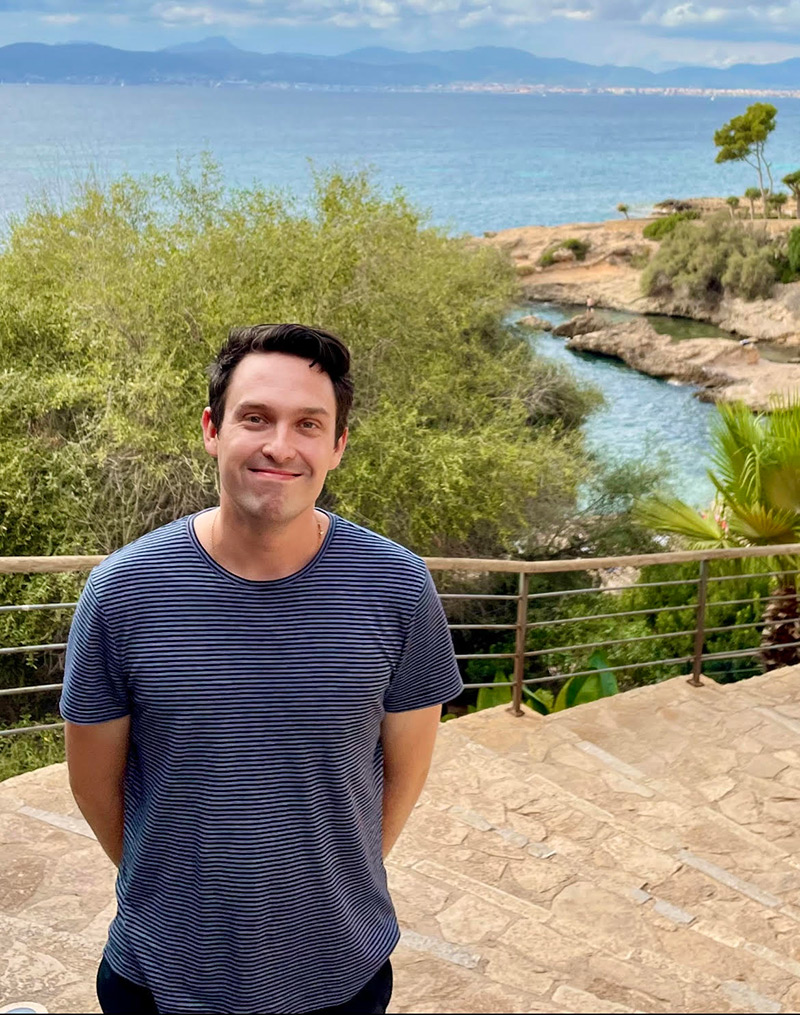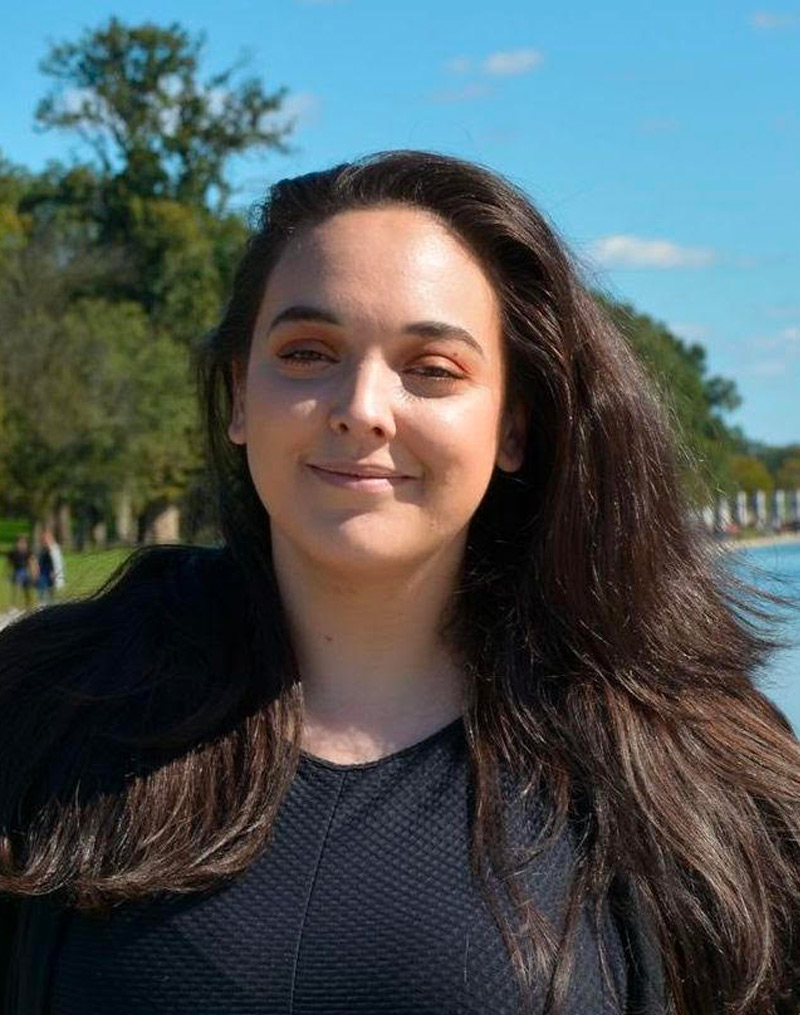The Institut Llull Institute and the North American Catalan Society (NACS) announce a scholarship to support graduate studies in the field of Catalan Studies and to help promote the development of Catalan Studies at universities in Canada or the United States.

CELIA SAINZ
About
Celia Sainz is a PhD candidate in Hispanic Literature and Linguistics at the University of Massachusetts Amherst. She obtained a Master of Arts from the same university with her video essay “Cinema Turns: Catalan Creative Documentary.” She also participates in curatorial work for film festivals, like the Massachusetts Multicultural Film Festival as Assistant Curator. She has produced numerous video essays, some of them have been featured in [In]Transition and Feminist Media Histories, as well as featured in the Sight and Sound ‘Best Video Essay’ poll in 2021. This semester she is scheduled to defend her doctoral thesis titled Ecopathic Imaginaries: Iberian Visual Cultures in the Anthropocene, where she combines ecocriticism and affect studies to explore the representational challenges of the ecological crisis in narrative films.
Celia’s dissertation focuses on the relationship between climate change, affect and cinema, and other audiovisual productions. She delves into the emotional dimensions of climate change and the Anthropocene which she calls—borrowing Timotheus Vermeulen’s term—ecopathy. Ecopathy, from Ancient Greek πάθος (páthos, “suffering”) and οἶκος (oîkos, “house”), expresses both the awareness of being mentally and physically embedded in both the environment and the more-than-human and the range of emotions stemming from that awareness amidst environmental degradation. In other words, ecopathy encompasses the distinctive affective modes generated by the transformations arising in the Anthropocene. She explores how different media elicit certain affective appeals. Her work draws on scholarship on material ecocriticism, like Jane Bennett and Stacey Alaimo, and ecocritical film scholars like Alexa Weik von Mossner and Nicole Seymour. Celia applies this framework to demonstrate how environmental changes elicit new affects and sensibilities that can be traced in environmental works of art, particularly in the audiovisual form. Thanks to the Dissertation Fieldwork Grant awarded by the North American Catalan Society, she focused on the impact of narratives that are created in spaces normally marginalized from the center, such as the periphery of the Iberian peninsula, to explore the unequal impact of climate change in different communities. She contributes to challenging anthropocentric views of cinema and culture and our position of mastery towards the non-human, as well as to trace the new moods that appear from this awareness of interconnectedness and destruction.
Impact of the scholarship
I feel very grateful to the North American Catalan Society and the Institut Ramon Llull for bringing me the opportunity of progressing my dissertation work with the fellowship. It was an honor to be selected for this grant. The confidence put in me was a real motivation to write my research project and to keep pursuing my Ph.D. career. The fellowship’s aid allowed me to put a pause on my teaching work and to concentrate almost exclusively on my dissertation. Teaching a class can take a lot of dedication, and the activities involved in the process—preparing, imparting, grading, etc., —take away from our research time.
The fellowship has not only given me time and space to work on my project, but it has also helped me to make my dissertation my absolute priority. The fellowship’s aid extended beyond the two semesters’ stipend. It also allowed me to freeze my university scholarship for said time and, thanks to that, to extend my research and writing time for one more year.
Therefore, this grant helped me not for one year, but for two. In summary, this fellowship helped me in many different and valuable ways. The ability to have a year to work exclusively on my research project is a luxury available to very few graduate students. I was able to take time and space to reflect and process many aspects of my dissertation, in a way that it would have been difficult for me to achieve without it. For that, I am incredibly grateful, and I hope many other graduate students can benefit from it in the future.

JAMES RAMSBURG
About
James Ramsburg is a PhD candidate in Hispanic Linguistics in the Department of Spanish and Portuguese Studies at the University of Minnesota. In addition, he has also worked with the Center for Advanced Research in Language Acquisition at the same institution and the Sociolinguistic Research Group of the Balearic Islands at the University of the Balearic Islands. His research focuses on identifying and explaining dialectal variation, especially in the lexicon and morphosyntax.
His dissertation project, Social, structural, and spatial dynamics of language contact: Mapping the lexicons of Catalan-Spanish bilingual youth in Mallorca, seeks to provide a comprehensive, contemporary account of the state of the Majorcan Catalan lexicon, with an emphasis on the lexical choices of the island’s youth. The ultimate goal is to determine the degree of lexical maintenance and/or shift among Majorca’s Catalan-speaking youth, identify the principal linguistic and social factors that govern these processes, and provide linguistic authorities with relevant, data-driven policy recommendations for the protection of the dialect.
Impact of the scholarship
Receiving the NACS/IRL fellowship has been a pivotal moment in my academic journey. Since October 2022, this scholarship has significantly propelled my dissertation project forward. My research, focused on the linguistic aspects of Majorcan Catalan, demanded extensive fieldwork and collaboration, which the fellowship made feasible.
The grant enabled me to travel to Majorca, where I conducted valuable fieldwork at the University of the Balearic Islands. This experience was not just about data collection, which was substantial with over 2200 participants, but also about immersing in the academic community there. Joining the Sociolinguistics Research Group of the Balearic Islands, I presented my research and collaborated with experts like Dr. Elga Cremades, enhancing the scope of my study.
Back at the University of Minnesota, the fellowship continued to support me as I embarked on data analysis, developing statistical models crucial for my dissertation. The upcoming return to Majorca, supported by the fellowship, is crucial for finalizing data collection and consultations.
This scholarship hasn’t just funded my research; it has opened doors to invaluable academic networks, deepened my understanding of my field, and is instrumental in completing my dissertation. The generosity of the North American Catalan Society and the Institut Ramon Llull has been a cornerstone of my academic success.

ALEXANDRA MIRA ALONSO
About
Alexandra Mira Alonso is a PhD Candidate in Literature and Cultural Studies in the Department of Spanish and Portuguese at Georgetown University. She researches intersectionality in representations of Peninsular popular culture of the 20th and 21st centuries. From a transnational perspective, she also studies historical memory, nostalgia, and the accepted elements of customs and bad taste represented in the working-class culture of the Iberian Peninsula. Her most recent article, “Community, crisis, and humor: The Transmission of Spanish Costumbrismo through Covid-19 Memes” (Hispanófila, 2021), explores how uncontextualized memes of Spanish trash culture shaped the Covid-19 confinement. Her dissertation, provisionally titled “Radiografías de lo cutre: culture obrera ibérica del siglo XXI,” aims to redefine the concept of “cutre” through the study of trash culture as a cultural construct arising from neoliberalism and techno-globalization. This dissertation explores, among others, Catalan-Caribbean music from its beginnings to the present day (with Gato Pérez, Bad Gyal or Rosalía), the 70’s queer performances in Barcelona (Nazario Luque and Ocaña) as a salvation of the bad taste, and the commodification of nostalgia in TV series such as Aquí no hay quien viva.
Impact of the scholarship
The doctoral scholarship from the NACS and the Institut Ramon Llull has allowed me to carry out and participate in a series of academic activities necessary to complete the writing of my dissertation. Firstly, throughout the academic year, but especially during the summer, the scholarship allows me to travel to research archival collections and temporary exhibits. For example, this summer, the grant will allow me to travel (on multiple occasions) to various cultural institutions to carry out research tasks, particularly in Barcelona, Tarragona, and Madrid. In addition, the grant also allows me to present my research at both national and international colloquia, such as NeMLA, MLA, or the NACS colloquium itself, where I can receive feedback on how to improve and expand the project. Finally, one of the highlighted aspects is that I have been able to acquire books and other cultural materials (such as documentaries, posters, or interviews) that are hard to find or otherwise, withdrawn from the market. These materials are not only of significant importance for my dissertation but also for the Catalan culture class that I am teaching (stemming from my research project) to undergraduate students specializing in Hispanic and Romance languages.
